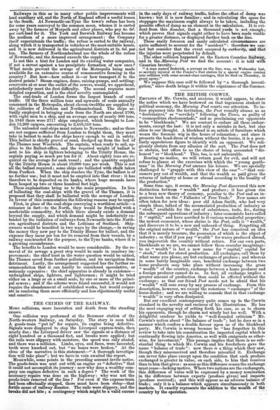THE CRIMES OF THE RAILWAY.
MORE collisions, more laceration and death from the standing causes.
One collision was performed at the Boxmoor station of the North-western Railway, on Saturday. The story is soon told. A goods-train "put in" for repairs, its engine being defective. Signals were displayed to stop the Liverpool express-train, then nearly due ; the Liverpool driver saw the signals at a distance of eight hundred or a thousand feet, and breaks were applied; but the rails were slippery- with moisture, the speed was only abated, and there was a collision. Limbs, eyes, and faces, were lacerated, teeth were knocked out, but "no bones were broken." At the close of the narrative is this statement—" A thorough investiga- tion will take place" ; but we have in vain awaited the report.
Meanwhile, some points in the preceding account invite notice. The goods-train was sent out with an engine so " defective " that it could not accomplish its journey : now why does a wealthy com- pany use engines defective in such a degree ? The work of the necessary repairs was done on the highway : why was not the goods-train removed off the line P For even if the express-train had been effectually stopped, there must have been delay—that fertile cause of railway disaster. The rails were slippery, and the breaks did not bite ; a contingency which might be a valid excuse in the early days of railway traffic, before the effect of damp was known : but it is now familiar ; and in calculating the space for stoppages the maximum ought always to be taken, including the possible effect of damp as an element in the calculation. It is evi- dent from this disaster, that a thousand yards is not enough; which proves that signals ought either to have beezi.mide visible for a greater distance, or displayed further back on the line. These easily foreseen and easily calculated circumstances are quite sufficient to account for the " aocident" : therefore we can- not but consider that the event occurred by authority, and that the injuries were perpetrated by default. The other collision happened on the Eastern Counties Railway, and in the,Morning Post we find the account : it is told with Cseaarian brevity— "A. man named Roderick, a servant on the line, was, on Wednesday last, so severely injured at the Ponder's End station by a special engine coming into collision with some second-class carriages, that lie died on Thursday, in great agony." We suppose this case will be followed by "a thorough investi- gation," since death brings it within the cognizance of the Coroner.


























 Previous page
Previous page